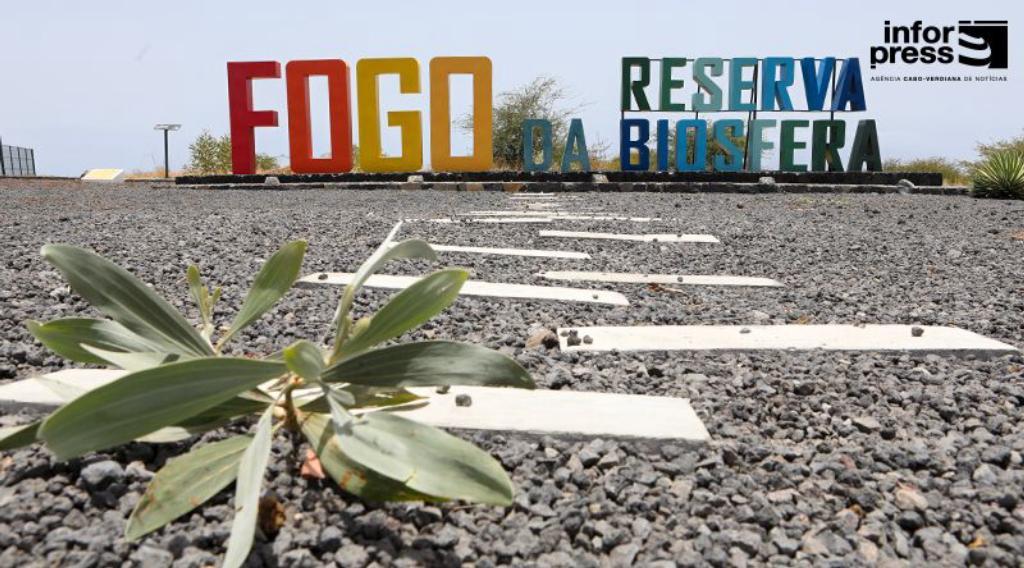Africa-Press – Cape verde. Five years after Fogo Island was classified as a World Biosphere Reserve by UNESCO, civil society representatives and tourism operators are skeptical about the designation’s practical impacts, pointing to management flaws and a lack of publicity.
Declared on October 28, 2020, along with Maio Island, Fogo became one of Cape Verde’s first two Biosphere Reserves, a distinction that recognizes not only the territory’s environmental value but also its cultural heritage and potential for sustainable development.
The Fogo Biosphere Reserve covers the entire island and a three-mile strip of surrounding sea, organized into three zones: a core zone, with an area of 6,919 hectares; a buffer zone, with 15,031.3 hectares; and a transition zone, with 50,191.7 hectares, between terrestrial and marine areas.
Despite international recognition, several local voices indicate that the classification has not yet had a concrete impact on the lives of the population.
“I haven’t seen any major structural projects or a major conference with international experts to promote the island’s natural resources,” said Miguel Montrond, a master’s degree in Agronomy and resident of Chã das Caldeiras, who believes the island remains unable to fully exploit the potential benefits of the designation.
“It’s not just a sign saying ‘Fogo Biosphere Reserve’ that should be the most visible gain,” he added, advocating for more scientific exchange, environmental appreciation, and promotion of the island.
Miguel Montrond highlighted the need for investment in scientific research on local flora and fauna and the promotion of indigenous products such as wine, coffee, and cheese.
“I expected marketing for the island, to showcase our best—the landscape, the unique culture and habits, the volcanology, viticulture, oenology, and Fogo’s unique sports. I also expected greater environmental appreciation among civil society and government officials, so we can achieve the long-awaited sustainability,” he lamented.
Professor and cultural activist Fausto do Rosário shares the same opinion, and believes there is an inconsistency between the Biosphere Reserve designation and current practices of environmental disrespect, such as sand extraction on the beaches of Fonte Bila and Nossa Senhora da Encarnação, or the disorderly occupation of Chã das Caldeiras.
“We have the statute, but little more,” said Fausto Rosário, who recalled that on the same day the designation was announced, dozens of trucks were illegally collecting sand from Fonte Bila beach.
He noted that “the designation should signify a new stance, but environmental crimes continue to go unpunished.”
Fausto Rosário also criticizes the growing degradation of Chã das Caldeiras, highlighting the trash, disorderly occupation, and lack of regulation as signs of neglect.
“Honestly, and somewhat boldly, I would say that the island hasn’t felt the effects of the reserve. We have the status and little more,” stated Fausto do Rosário, who believed expectations were high.
The professor advocates for the creation of regulations and management tools that allow us to defend and preserve environmental balance without compromising the economic activities of local populations and emphasized that “defending and preserving the environment doesn’t mean you can’t take anything.”
“If there were a dedicated management mechanism that, through its actions, improved the quality of life and sustainability of communities, that would already be a great step forward,” he emphasized.
For tour operator and guide Mustafa Erin, the lack of visible impact is largely due to a lack of direct information to the population.
“Many people don’t even know what a Biosphere Reserve is. We need concrete actions—presentations, training, events—to explain the meaning and responsibilities that the title entails,” he argued.
According to Mustafa Erin, the Chã das Caldeiras community is naturally adapted to coexisting with nature, but a strategy is lacking to transform these values into real benefits, especially in sustainable tourism.
José Lima Araújo, local coordinator of the Destino Fogo project, linked to sustainable tourism, recognizes advances such as the creation of an action plan, a logo, a reserve website, and training provided by the Projeto Vitó Association, but considers the impacts to still be “limited.”
“The reserve could serve as a seal of quality for tourism products and services. But there has been a lack of ownership by decision-makers and society itself. There is a plan, but the management unit to execute it is lacking,” he emphasized.
José Araújo also advocated for the promotion of geotourism, leveraging the island’s unique geology and geomorphology as a complement to ecotourism, currently limited to the Natural Park.
Tour operator Rosando Monteiro “Cacuca,” from Chã das Caldeiras, also recognizes some positive impact, especially on nature tourism, but below expectations.
“We expected a bigger increase.s visible tourism linked to nature, biodiversity, ecological routes. There’s a lack of publicity at international fairs and in the local media,” he observed.
He believes the reserve’s potential needs to be further explored in schools, the media, and public events, becoming part of the collective imagination.
Five years after UNESCO recognition, Fogo Island’s classification as a World Biosphere Reserve continues to be seen as a symbolic title, whose concrete benefits have yet to translate into sustainable improvements.
Several segments of civil society and experts warn of the urgent need for integrated management, effective communication, and community engagement to transform the title into a true driver of sustainable development.
The lack of a functional management body, the continuation of environmentally harmful practices, and poor coordination between the island’s municipalities are highlighted as the main obstacles.
Meanwhile, Fogo’s volcano, vineyards, and dramatic landscapes continue to wait for the country and the world to recognize and value the UNESCO seal, not as a trophy, but as a living opportunity for transformation.
For More News And Analysis About Cape verde Follow Africa-Press






